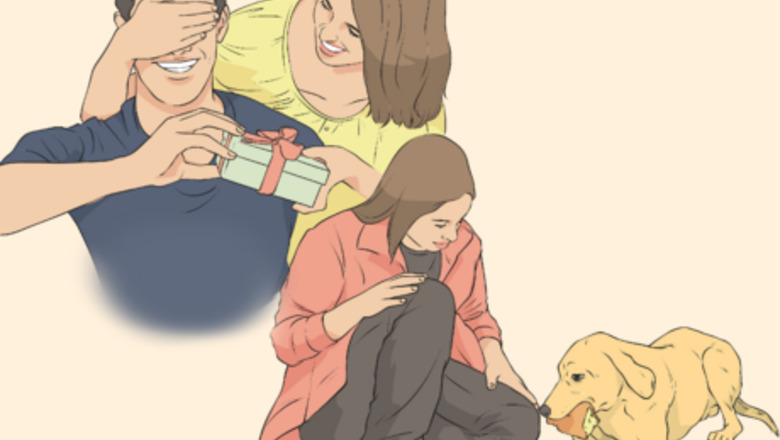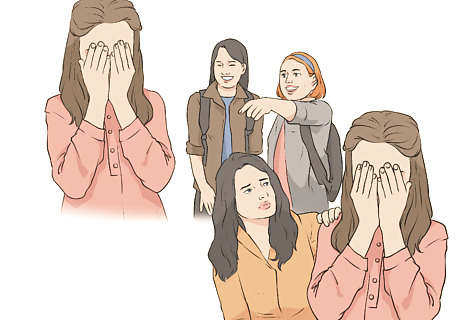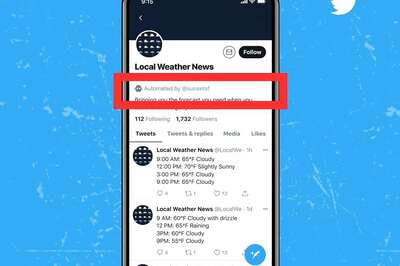
views
- Being "nice" is about treating others well and as a result, being well-liked. Being kind means acting in another person's best interest, even when it upsets them.
- Synonyms for "nice" are agreeable, polite, and pleasant. "Kind," though, is synonymous with moral, generous, and good.
- There's a lot of overlap between kind and nice acts: both are generally good and make other people happy.
Nice vs. Kind

Niceness is about pleasing other people, and kindness is about being moral. Being nice means that you're pleasant, agreeable, and enjoyable to be around. In short: when you're nice to someone, you're successfully acting in a way that makes them like you, which is great! Being kind, though, is more about being moral or good. The key here is that “nice” people and “kind” people are motivated by different things—nice people want to be liked and to keep the peace; kind people are motivated by values and virtues. Both are great, but they are a little different! Though, acting nice is still, typically, a moral act. When you’re pleasant and sunny, it makes others happy, and that’s amazing! Sometimes to be kind, though, you can’t be agreeable or "nice." Say that someone is talking behind a friend’s back. A nice person might smile and nod, but a kind person would stand up for what’s right. Words associated with “nice:” sweet, sunny, likable, pleasant, agreeable, delightful, polite. Words associated with “kind:” good, moral, fair, generous, compassionate, considerate.
Examples of "Nice" & "Kind"

A friend has had a bad day and needs some cheering up: It seems like your pal is down in the dumps, and they could really use a day brightener. They haven’t asked for help directly, but you can tell that they’d love some comfort from you. Nice and kind reaction: In this case, a "nice" reaction and a "kind" reaction would probably look the same! Whether a person is motivated by a desire to be pleasant or a desire to be good, they’d probably do their best to brighten their friend’s day, maybe with a hug or a sweet treat. Though the difference in motivation can lead to different choices a lot of the time, it doesn’t always!

Someone is being bullied in your workplace: Say that all of your coworkers are ganging up on a quieter colleague of yours. They’re doing it subtly, so your boss is unlikely to find out. The behaviors are clearly bothering the victim, but your unkind coworkers won’t stop. Kind reaction: A kind person would do whatever they could to end the bullying. They wouldn’t be afraid to tell the bullies that they’re being unkind, they’d console the victim, and in all likelihood, they'd inform their boss as well. In short, they might upset the bullies and lose a few friends in the process, but they'd be doing what they believed was right. Nice reaction: A nice person wouldn’t join in on the bullying, but they might not stop it either. They’d likely stay quiet, so that they don’t make their coworkers uncomfortable. Though they'd probably be nice to the victim in private, they might not take any action to end the bullying. This is because their goal is to make everyone happy, including the bullying coworkers.
How to Be Kind

Look for ways to give love. Be on the lookout for opportunities to lend a hand—you’ll be surprised by how great it makes you (and others) feel. Try to have your good-deed antenna up at all times, so that when someone needs help, you’re ready to jump into action. When you have a free window, sit down and brainstorm a kind act you could complete today, or set a good-deed goal for the week. You could: Volunteer: Dedicate your time to an important cause, like the Humane Society or a soup kitchen. You could even choose a charity that aligns with your passions. Offer a compliment: People remember kind words for longer than you'd think. Brighten someone’s day and highlight their positive traits (“You know, you have great eyes…”) Do a random act of kindness: Who wouldn’t love an out-of-the-blue baked good or handwritten letter? Think of something sweet you could offer someone, then leave it on their porch. Be generous with your talents: Brainstorm your skills or professional expertise, then donate your special abilities to a worthy cause. For instance, you could mentor someone at work or coach a little league team. Sign up for a CPR course: Spend your own time learning a life-saving technique, so that one day, you might be able to give someone the ultimate gift.

Put yourself in others’ shoes. Kind people think about how their actions affect people. In a room of friends, they’re always considering the emotions of others, and thinking about how they can help. This can take practice, but in no time, you’ll grow your empathetic muscles and be able to spot a person who could use your light. When you talk to someone, practice thinking to yourself: How are they feeling? What can I do? Pro tip: even if you’re not sure about how someone’s feeling, there are some kind acts that most people appreciate no matter what. For instance, if someone is sitting alone at a party, there’s a really good chance that they’d like you to talk to them, even if they don’t actually feel awkward. If someone seems like they might be feeling down, check in with them. Even if you’re wrong (and they’re feeling great), they’ll love knowing that you care. Invite other people along when you mention your plans. Whether or not they feel left out or uncomfortable, they’ll still love to know that you’d want them with you.

Listen. Listening is the cornerstone of empathy. We all can get so caught up in our own story, it’s easy to forget to check in with other people. When you’re not sure what someone needs, but you want to be kind: ask them how they’re doing. Ask them follow-up questions, so they know you’re really engaged. And always reassure them that you love to listen to them speak, and they shouldn't feel like they're burdening you. Talking can be amazing therapy, and you might end up making someone’s day. Ask them how they’re feeling: “So, how have you been? I feel like I haven’t caught up with you in forever…” Follow up on events in their life so they know that you're thinking of them: “How did that big presentation end up going?” If you to discuss something serious or they seem upset, remind them that you’re a resource: “You know, you can always reach out to me when you need a friend.”

Be brave. As we’ve mentioned, sometimes kind people have to be courageous. If your goal is to become a kinder person, you’ll need to remember that sometimes, being kind can actually be a little uncomfortable. You might end up confronting a bully, going against the crowd, or ruffling feathers along the way. But as long as your goal is to make the world a better place, then trust that you’re acting out of kindness. And we commend you for it! Focus on who you’re helping. If you’re feeling uncomfortable going against the grain, try to shift your focus from who you’re upsetting to who you’re helping. Remind yourself of all the good you’re doing! Get support if you need it. Even brave, kind people need help from friends. If you’re in a bit of a tough situation, talk it through with your team. Loved ones will help remind you not to listen to haters. Remind yourself of your values and beliefs. If people are upset with you, remind yourself of why you do what you do. It helps to remember what you believe in: I believe that no one should be bullied, that’s why I stood up for Andy…

Remind yourself that lighting someone’s candle won’t dim your own flame. Kindness can be exhausting, especially if you give more than you receive. It can help to remember that giving love isn’t transactional; maybe, when you think about it, you’ll decide that you don’t want anything in return. Because kindness is a multiplier: every time you do something good, you’re creating more light in the world—light for another person, and light in your own life. It’s like magic! All that said, boundaries are important, too. There’s a difference between giving kindness and letting others take advantage of you. If you’re unsatisfied with your relationships, remember that it’s totally valid to set boundaries to keep yourself safe (and also, to teach others not to be unkind as well!). Boundary setting is actually another act of kindness in a way—specifically, kindness to yourself!


















Comments
0 comment